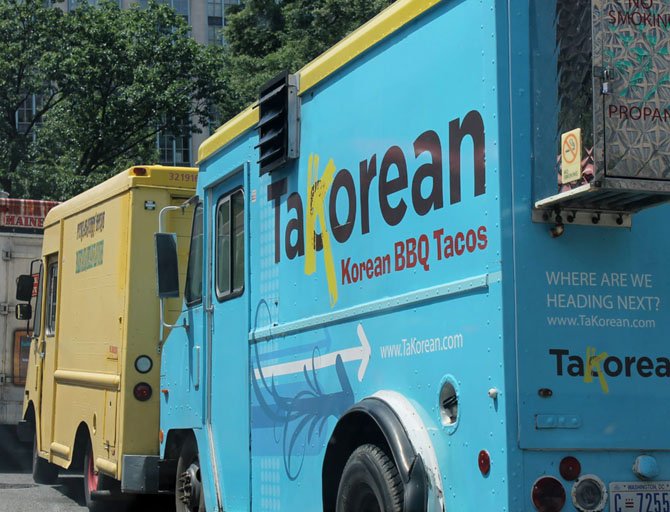The Fairfax County Planning Commission held a public hearing concerning the operation of food trucks, like these in D.C., on July 30. Photo by Janelle Germanos.
Fairfax County is considering a change to the zoning rules concerning the operation of food trucks within the county.
Under new rules, vendors would pay under $200 for licensing and would require permission from property owners.
This is compared to the $16,375 fee that is required under the current ordinance, which classifies food trucks as free-standing fast-food restaurants and requires two public hearings.
Food truck vendors would be required to receive permission from the property owners before operating their trucks. The Virginia Department of Transportation and county code prohibits food trucks from operating on public roads. This would not change under the new proposal.
The Planning Commission held its first public hearing on the food truck ordinance on July 30.
“This is an important and unique ordinance for the county. We want to get it right the first time. I think we have people on the side of the issue who are willing to compromise, to express their ideas, and we want to ensure they have a venue to do so,” said Janyce Hedetniemi, at-large member of the planning commission.
Last year, 14 permits were given to food truck vendors for operation in mostly commercial areas.
“The proposed amendment would allow food trucks as an accessory use in primarily non-residential areas of the county,” Mavis Stanfield of the Zoning Administration Division said at the meeting. “The intent of regulating food trucks as accessory uses is to provide food options on-site where employees or customers associated with the principal use may otherwise have to drive to other locations to eat.”
Che Ruddell-Tabisola, executive director of the DMV Food Truck Association, said at the hearing that food trucks make positive contributions to the community.
“Our group spans the socio-economic gannet and it’s one of the things I enjoy about this industry. We have folks who are professionally trained chefs, we have ex-professionals, for whom a food truck is a second career and gives them a chance to operate their own business,” Ruddell-Tabisola said. “Our businesses and our cuisine reflect this diversity and constitute a true melting pot of owners who are dedicated and passionate.”
Throughout American history, street vending, Ruddell-Tabisola said, has provided a path of upward social mobility for people who don’t have a lot.
“It’s one of the reasons I’m a passionate advocate for street vending. We have seen this tradition continue in the DMV. To date, we have 22 food trucks that have gone into a brick and mortar operation of some kind, and we have a growing number of brick and mortar operations that are opening food trucks as a way to grow and expand their business,” he said.
The average food truck creates four full-time employees, Ruddell-Tabisola said.
“Will those four jobs save all the problems with the economy? No. But do those four jobs matter to those four families? Absolutely,” he said.
Trucks can only sell at industrial or commercial properties with a required 25,000 to 30,000 minimum square feet of gross floor area, a requirement which Ruddell-Tabisola says the association cannot find in any other jurisdiction.
“What we see in other areas is food trucks partnering with local businesses that cannot meet this requirement. In a way, the ordinance shuts out these small businesses, such as wineries, breweries, taverns that do not serve food, but for whom a partnership with a food truck makes a lot of sense,” he said.
It should be up to the property owners to decide whether or not they want food trucks on their property, Ruddell-Tabisola said.
Doug Maheu, Fairfax county resident, said that Tyson’s Corner is a “postcard” location for food trucks.
“Food trucks have been used time and time again to activate space. Tyson’s is an ideal and perfect example of how they can do that, with a new metro system coming in, you don’t want people driving. Food trucks create pedestrian traffic,” Maheu said.
Jon Clark, a member of the Mason district council board, is concerned that the proposal is incomplete because it does not state where food trucks would be parked when not in service. Clark is concerned that the food trucks would be parked in residential areas overnight.
“This proposal is seriously incomplete because it does not address what for us is the most important element of a food truck ordinance, that is where are these food trucks going to be parked when not in service,” Clark said.
The decision is deferred to September 10, following a public hearing at the September 9 Board of Supervisors meeting.
